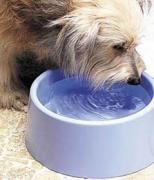Heatstroke

Heatstroke
Today, on this first day of summer, I’m enjoying the hot, humid weather, but I’m also thinking about heatstroke. As I walk around the city, I notice lots of dogs out and about with their owners who are also enjoying the warm weather. Although humans seem to love hot summer days, our pets may not appreciate them as much as we do. I am hoping this blog will help pet owners prevent catastrophic heatstroke in their pets and become prepared to recognize and respond to the clinical signs of heatstroke in cats and dogs.
Heatstroke results from an imbalance between heat production by the body and heat dissipation through the body’s innate cooling mechanisms. Heatstroke is especially common when the weather turns hot abruptly and pets have not had time to acclimatize to the warmer temperatures. On a hot, humid day, people and pets have greater difficulty keeping cool due to a decrease in the body’s ability to dissipate heat. Couple that with a hot, stuffy apartment and an empty water bowl and you have heatstroke.
Humans sweat to cool down. Dogs and cats lack the ability to sweat as an effective cooling mechanism and they pant instead. All dog owners have seen their dogs pant, but most cat owners have never seen their cats pant. A panting cat deserves a close second look, as it may need urgent medical care. But panting is only one sign of impending heatstroke. In addition to excessive panting, other signs of heatstroke include dry, dark red gums, collapse, unresponsiveness, inability to move or an elevated heart rate. The rectal temperature in heatstroke is typically >104oF. (Remember, dogs and cats are normally warmer than people and typically have a rectal temperature of 100-102oF.) If you find your pet exhibiting any of the above symptoms, don’t bother taking the temperature—head for the nearest animal ER.
When making the decision to head for the ER, pet owners might be tempted to stop and cool their pet in the tub. Research has shown that time is of the essence. Grab all the ice packs or frozen vegetables from the freezer on your way out the door and pile them on your pet on the way to the ER, but don’t waste time in the tub. Nearly all veterinary clinics have a big, deep tub which can be used to cool off heatstroke victims.
Preventing heatstroke is cheap and easy. It just requires some forethought. First, on hot days, provide plenty of cold water. Put out a fresh bowl every morning. Keep another bowl in the freezer filled with frozen water as a hot day backup bowl. When the weatherman predicts a hot, humid day, set it out and let it thaw gradually over the course of the day to provide a cool afternoon drink. If you have a sunny home, close the blinds to decrease the indoor temperature or leave the air conditioning on low.
Although I hate to see pets lounging on hard tile floor in the foyer or bathroom, it’s a good place on a hot day as the cool floor serves to conduct the heat away from the body. Place a fan near a favorite nap spot to increase convective cooling. Plan daily exercise for early or late in the day when it is cooler, and be especially careful with short nosed dogs (English Bulldog, French Bulldog, Pug or Boxer are examples), overweight dogs and dogs with dark or thick coats, as these dogs are more likely to suffer heatstroke because these physical attributes hamper the body’s innate cooling mechanisms.
If you experience a pet emergency, such as heatstroke, rush your pet to the animal ER immediately. The Animal Medical Center is open 24 hours a day, 7 days a week for emergency, specialty and routine care. Contact us at 212-838-8100.
___________________
For nearly a century, The Animal Medical Center has been a national leader in animal health care, known for its expertise, innovation and success in providing routine, specialty and emergency medical care for companion animals. Thanks in part to the enduring generosity of donors, The AMC is also known for its outstanding teaching, research and compassionate community funds. Please help us to continue these efforts. Send your contribution to: The Animal Medical Center, 510 East 62nd Street, New York, NY 10065. For more information, visit www.amcny.org. To make an appointment, please call 212.838.7053.


































